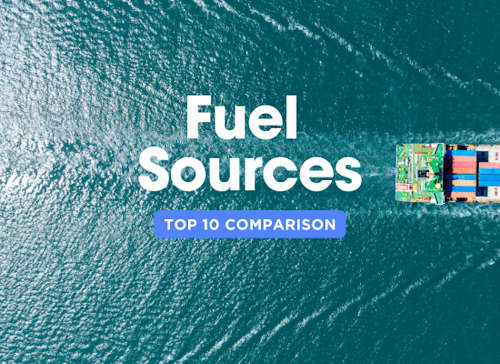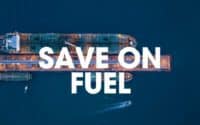From Conventional to Cutting-Edge: The Top 10 Benefits of Marine Fuels

The global shipping industry is undergoing a significant transformation as it navigates the complexities of fuel efficiency, environmental regulations, and operational costs. With a variety of fuel sources powering commercial vessels, each option presents unique advantages that cater to different segments of the market. Whether it's the widespread use of conventional diesel, the growing adoption of LNG, or the innovative exploration of alternative fuels, understanding the benefits of each fuel source is crucial for ship owners and operators. This guide explores the top 10 benefits of the seven main fuel sources in the commercial shipping space, starting with the most prevalent: conventional diesel.
We're not here to pick a winner; instead, we aim to provide the information so you can draw your own conclusions. As always please send comments/suggestions to editor @ shipuniverse.com
Diesel / LNG / Hybrid / Methonal / Nuclear / Wind / Biofuels
Conventional Diesel
Conventional diesel remains the backbone of the commercial shipping industry, powering the majority of vessels worldwide. Its widespread availability and proven technology make it a reliable choice for ship owners and operators.
| Ship Universe: Conventional Diesel | |
| 1. Widely Available | Diesel fuel is readily available at nearly every port worldwide, ensuring uninterrupted operations for ships. |
| 2. Mature Technology | Diesel engines are well-developed and reliable, with decades of proven performance in maritime applications. |
| 3. High Energy Density | Diesel fuel stores a large amount of energy per unit, reducing the frequency of refueling stops and optimizing space. |
| 4. Cost-Effective Infrastructure | Existing infrastructure for diesel engines and fuel supply is widespread and cost-efficient. |
| 5. Ease of Refueling | Refueling processes for diesel are straightforward and well-understood by port operators worldwide. |
| 6. Durable and Reliable Engines | Diesel engines are known for their durability and longevity, requiring less frequent replacement and repairs. |
| 7. Global Standards and Regulations | Diesel engines are governed by standardized regulations, making compliance easier across different regions. |
| 8. Versatile Fuel Options | Diesel engines can run on a variety of fuel types, including marine diesel oil (MDO) and heavy fuel oil (HFO). |
| 9. Powerful Performance | Diesel engines provide strong, consistent power output, making them suitable for large vessels. |
| 10. Established Support Network | An extensive global network of suppliers, mechanics, and spare parts ensures quick and easy maintenance and repairs. |
LNG
As the shipping industry shifts towards more sustainable practices, Liquefied Natural Gas (LNG) is emerging as a popular alternative to conventional diesel. LNG offers significant environmental benefits and has the potential to reduce operational costs in the long term.
| Ship Universe: Liquefied Natural Gas (LNG) | |
| 1. Lower Emissions | LNG significantly reduces greenhouse gas emissions, particularly sulfur oxides (SOx), nitrogen oxides (NOx), and particulate matter, making it a cleaner alternative to conventional diesel. |
| 2. Compliance with Environmental Regulations | LNG helps ship operators meet increasingly stringent international environmental regulations, such as IMO 2020, which mandates lower sulfur content in marine fuels. |
| 3. Reduced Fuel Costs | Although initial infrastructure costs can be high, LNG has the potential to lower fuel expenses over time due to its lower and more stable pricing compared to oil-based fuels. |
| 4. Abundant Supply | LNG is widely available with a growing global supply, reducing the risk of fuel shortages and price volatility. |
| 5. High Energy Content | LNG provides a high energy content per volume, which is comparable to traditional marine fuels, ensuring efficient operation of vessels. |
| 6. Safe Handling | LNG is non-toxic and evaporates quickly if spilled, reducing the risk of environmental contamination compared to oil spills. |
| 7. Potential for Dual-Fuel Engines | Many LNG-powered ships are equipped with dual-fuel engines, allowing them to switch between LNG and conventional fuels, offering flexibility in fuel management. |
| 8. Future-Proofing Against Regulations | Adopting LNG positions ship owners to better adapt to future environmental regulations, which are expected to become even more stringent. |
| 9. Lower Noise Levels | LNG engines typically produce less noise and vibration than conventional diesel engines, improving onboard comfort for crew members. |
| 10. Supporting Infrastructure Growth | The infrastructure for LNG bunkering is expanding globally, making it increasingly accessible for ships operating on international routes. |
Hybrid (Diesel-Electric, Battery-Assisted)
Hybrid propulsion systems, combining diesel engines with electric or battery-assisted power, are gaining traction in the commercial shipping industry. These systems offer the best of both worlds, providing the reliability of diesel engines while incorporating the efficiency and environmental benefits of electric power.
| Ship Universe: Hybrid (Diesel-Electric, Battery-Assisted) | |
| 1. Fuel Efficiency | Hybrid systems optimize fuel consumption by using electric power during low-demand operations, significantly reducing overall fuel use. |
| 2. Lower Emissions | The combination of diesel and electric power reduces greenhouse gas emissions, helping ship operators meet environmental regulations. |
| 3. Reduced Operating Costs | By decreasing fuel consumption and lowering maintenance needs, hybrid systems can lead to substantial long-term cost savings. |
| 4. Enhanced Maneuverability | Electric motors provide instant torque, improving vessel maneuverability, especially in tight port environments. |
| 5. Quiet Operation | Hybrid systems reduce noise levels during electric operation, creating a quieter environment onboard and reducing noise pollution. |
| 6. Flexibility in Fuel Management | Hybrid vessels can switch between diesel and electric power as needed, offering flexibility in managing fuel resources and optimizing efficiency. |
| 7. Extended Engine Life | Using electric power reduces the load on diesel engines, extending their operational life and reducing the frequency of major overhauls. |
| 8. Improved Safety | Electric systems provide redundancy, ensuring that the vessel can continue operating even if one power source fails. |
| 9. Future-Proof Technology | Hybrid systems are adaptable to future advancements in battery technology, allowing for easy upgrades and better performance over time. |
| 10. Reduced Environmental Impact | By minimizing fuel consumption and emissions, hybrid systems contribute to a lower overall environmental impact, supporting sustainable shipping practices. |
Methanol and Other Alternative Fuels
As the shipping industry continues to seek greener alternatives, methanol and other alternative fuels are gaining attention for their potential to reduce emissions and improve sustainability. These fuels, while still emerging, offer unique benefits that can help ship owners navigate the evolving regulatory landscape and contribute to a cleaner maritime environment.
| Ship Universe: Methanol and Other Alternative Fuels | |
| 1. Lower Carbon Emissions | Methanol and other alternative fuels produce fewer carbon emissions compared to traditional marine fuels, helping to combat climate change. |
| 2. Compliance with Emission Regulations | These fuels meet or exceed current and future environmental regulations, including IMO standards for sulfur and carbon emissions. |
| 3. Renewable Production Potential | Methanol can be produced from renewable sources such as biomass, making it a more sustainable option compared to fossil fuels. |
| 4. Safe Handling and Storage | Methanol is less toxic and safer to handle than many other marine fuels, with lower risks of fire and explosion. |
| 5. Versatile Use | Alternative fuels like methanol can be used in a variety of engine types and can also be blended with conventional fuels to enhance performance. |
| 6. Lower Sulfur Content | Methanol and similar fuels contain little to no sulfur, reducing the formation of sulfur oxides (SOx) and contributing to cleaner air quality. |
| 7. Potential for Carbon Neutrality | When produced from renewable sources, methanol can be part of a carbon-neutral fuel cycle, supporting global decarbonization efforts. |
| 8. Flexibility in Fuel Supply | The growing infrastructure for methanol production and distribution provides greater flexibility in sourcing fuel across different regions. |
| 9. Reduced Environmental Impact | These alternative fuels generally have a lower environmental impact throughout their lifecycle, from production to combustion. |
| 10. Supports Innovation and Development | The adoption of methanol and other alternative fuels drives innovation in fuel technology, engine design, and infrastructure, paving the way for future advancements in maritime sustainability. |
Nuclear
Nuclear power, while uncommon in commercial shipping, represents a unique and highly efficient energy source with the potential for long-term, uninterrupted operation. Though primarily used in military vessels and icebreakers, the potential application of nuclear technology in commercial ships is an intriguing concept for the future of the maritime industry.
| Ship Universe: Nuclear | |
| 1. Extremely High Energy Density | Nuclear fuel provides a far higher energy density than any conventional fuel, allowing ships to operate for years without refueling. |
| 2. Zero Carbon Emissions During Operation | Nuclear reactors produce no carbon emissions during operation, significantly reducing the vessel's environmental footprint. |
| 3. Long Operational Life | Nuclear-powered ships can operate for decades with minimal maintenance, offering long-term cost savings and operational stability. |
| 4. Independence from Fuel Supply Chains | Nuclear ships are not dependent on traditional fuel supply chains, reducing the risk of fuel shortages and price volatility. |
| 5. Capable of Extreme Endurance | Nuclear-powered ships can travel vast distances without the need to refuel, making them ideal for long-haul or remote routes. |
| 6. Stable Power Output | Nuclear reactors provide a consistent and stable power output, ensuring reliable operation under various conditions. |
| 7. High Efficiency | Nuclear energy is highly efficient, with a much smaller amount of fuel needed to produce the same energy as fossil fuels. |
| 8. Reduced Fuel Costs Over Time | While the initial investment in nuclear technology is high, the long-term fuel costs are significantly lower compared to conventional fuels. |
| 9. Minimal Environmental Impact from Fuel Extraction | Nuclear fuel extraction has a lower environmental impact compared to oil and gas drilling, reducing habitat destruction and pollution. |
| 10. Potential for Technological Advancement | The development and implementation of nuclear-powered commercial vessels could drive innovation in nuclear technology and maritime engineering. |
Wind-Assisted Propulsion
Wind-assisted propulsion is experiencing a revival as the shipping industry looks for innovative ways to reduce fuel consumption and emissions. By harnessing wind power through sails, rotor sails, or other aerodynamic devices, ships can supplement their primary engines, leading to significant fuel savings and environmental benefits.
| Ship Universe: Wind-Assisted Propulsion | |
| 1. Significant Fuel Savings | Wind-assisted propulsion can reduce fuel consumption by up to 20%, leading to substantial cost savings over the vessel's lifetime. |
| 2. Reduced Carbon Emissions | By relying partially on wind power, ships emit fewer greenhouse gases, contributing to a lower overall carbon footprint. |
| 3. Renewable Energy Source | Wind is a free and renewable resource, providing a sustainable way to power vessels without depleting finite resources. |
| 4. Low Operational Costs | Once the wind-assisted technology is installed, the operational costs are minimal, as the wind is a free energy source. |
| 5. Extended Range | By reducing fuel dependency, wind-assisted propulsion can extend the operational range of vessels, especially on long voyages. |
| 6. Enhanced Vessel Stability | Certain wind-assisted technologies, like rotor sails, can improve vessel stability by reducing rolling in rough seas. |
| 7. Flexibility in Application | Wind-assisted propulsion can be used in conjunction with any primary fuel type, offering versatility in its application across various vessel types. |
| 8. Positive Public Image | Using innovative and green technology like wind-assisted propulsion can enhance a company’s reputation as an environmentally conscious operator. |
| 9. Regulatory Compliance | Wind-assisted propulsion helps ship owners meet international emissions regulations, particularly in emission control areas (ECAs). |
| 10. Drives Innovation | The adoption of wind-assisted propulsion encourages further technological advancements and investment in sustainable shipping solutions. |
Biofuels
Biofuels represent a promising and more sustainable alternative to traditional marine fuels in the commercial shipping industry. Produced from renewable biological resources, biofuels can significantly reduce the environmental impact of shipping while offering similar performance characteristics to conventional fuels.
| Ship Universe: Biofuels | |
| 1. Lower Greenhouse Gas Emissions | Biofuels produce significantly lower greenhouse gas emissions compared to fossil fuels, helping to mitigate climate change. |
| 2. Renewable and Sustainable | Biofuels are made from renewable resources such as plant oils, algae, and agricultural waste, making them a more sustainable option than traditional fuels. |
| 3. Compatibility with Existing Engines | Biofuels can often be used in existing marine engines with little to no modification, making it easier to adopt them across fleets. |
| 4. Reduction in Sulfur Emissions | Most biofuels contain low levels of sulfur, helping to reduce sulfur oxide (SOx) emissions and comply with international regulations. |
| 5. Potential for Carbon Neutrality | When produced sustainably, biofuels can achieve carbon neutrality, as the carbon dioxide absorbed during the growth of the feedstock offsets emissions from combustion. |
| 6. Supports Agricultural Economies | The production of biofuels can support agricultural economies by providing a market for crops and agricultural residues. |
| 7. Reduces Dependence on Fossil Fuels | Biofuels help reduce the shipping industry's dependence on finite fossil fuel resources, contributing to energy security. |
| 8. Lower Particulate Emissions | Biofuels generally produce fewer particulate emissions than conventional fuels, leading to improved air quality and reduced health risks. |
| 9. Positive Public Perception | Using biofuels can enhance a company’s reputation as an environmentally responsible operator, appealing to eco-conscious customers and stakeholders. |
| 10. Versatile Feedstock Options | Biofuels can be produced from a wide range of feedstocks, including waste products, reducing the environmental impact of waste disposal. |

Do you have a Maritime Product or Service that may be of interest to Shipowners? Tell us about it here!
Do you have feedback or insights? Please reach out to editor @ shipuniverse.com



